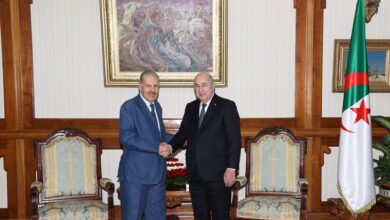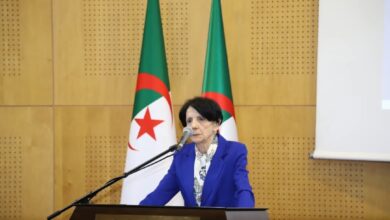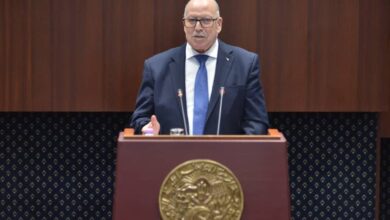This is how we will restore the national market to its true balance – Algerian Dialogue

Nasira Sayed Ali
Economists and the National Organization for the Protection and Rationalization of Consumers and their Environment valued the issues related to consumer protection and controlling the import mechanism for dry grains, white and red meat to public institutions, stressing that the government will continue to subsidize prices for a number of essential imported basic materials, and prevent any import of legumes outside the National Professional Grains Office, with precise definition. For the stages of product price, allowing the exclusive import of fresh red and white meat to meet the national needs of this material, and contributing to reducing its prices is a very reasonable and decisive policy according to which the market will be controlled and an indicator to continue supporting the purchasing power of the citizen.
This is how we will protect the consumer’s purchasing power
In this regard, the National Coordinator of the National Organization for the Protection of Consumers and their Environments, Fadi Tamim, said in his interview with “Al-Hiwar”, that the President of the Republic, in the outputs of the recent Council of Ministers, focused on the consumer aspect in a broad and large way, and this is clearly evident in the axis of subsidizing basic materials, and those Imported, as well as the exclusive import of legumes by the National Office of Dry Grains, and also opening the field of import of fresh meat, both white and red, indicating that the support policy, the same speaker adds, has been the choice of the Algerian state since independence, and it is a demand that our organization values.
Regarding the exclusivity of importing legumes and dry grains by the National Dry Grains Office, the latter began to move and restore balance to the legume market by opening its branches throughout the country and worked to limit the price of dry grains starting from the producer, passing to the wholesaler, reaching the retailer, and thus reaching the consumer. At the price that serves him and according to his ability, and that the retailer must be compassionate to the consumer by being satisfied with a reasonable profit margin, and here the same speaker suggests the necessity of obligating the National Grain Office to draw up an agreement and conclude a contract between it and the retail merchants and set a profit margin for him, and anyone who violates it will be punished by the law, either by introducing a law It is related to regulating the prices of legumes, or the contract will be suspended or the merchant will be fined, and Algerian law adds Tamim Fadi is clear in this area. As for the red and white beans that will be imported in order to reduce the prices, the national coordinator of the National Organization for the Protection of The two articles are for the consumer who is burdened by the prices of this division and which do not match her monthly salary, because livestock does not meet the demand of the red and white meat market, calling for the development of our livestock and poultry breeding in the future and subjecting the market to the digitization that the President of the Republic is insisting on.
On the other hand, the National Coordinator of the National Organization for Protection calls for changing the support policy, because the support does not reach the target class directly, and that there is a specialized committee studying the new support mechanisms, and as a consumer defense organization we have presented the necessary proposal force, and when we say support means protecting the purchasing power of the citizen in It concerns basic materials that are widely consumed, which will keep purchasing power somewhat balanced.
The restoration process returns to its original state
In this context, the economic expert, Dr. Bouhous Bouchikhi, called for “dialogue.” I have always called in many situations for the necessity of returning the importation process to the official department. Since the source of hard currency is the state, why does it not itself begin practicing foreign trade when it imports and sells at a fair price, instead of… Granting it to private importers who scoop from the state treasury and import all kinds of grains and then sell them at ridiculous prices, citing international conditions such as the high cost of transportation, for example.
Dr. Bouchikhi said that he is against private traders who are given hard currency at the official price and not at the “square” price and buy dry grains and then sell them at their own price and attribute the reasons for their rise to the global stock exchange.
The economic expert, Dr. Bouchikhi Bouhous, confirmed in the same context that the Algerian state in the past was concluding cooperation agreements with the countries that were initiating the import process, and the price of sugar was sold for only 2 DZD, and when the process was entrusted to private individuals, it made the prices of some importers of dry grains and meat control. In the Algerian people’s livelihood, they impose astronomical prices that threaten national security. The return of the national debt for dry grains to its original place in the economic arena will achieve abundance and a fair price, provided that the university, scientific research, and the absorption of university graduates are integrated.
The return of farmers’ markets and Algerian arcades is part of the solution
In the same context, economist Dr. Bouhous Bouchikhi called for the importance of reviving the networks of Algerian farmers’ markets and corridors across the entire national territory, which sell their products at the official price, taking into account the purchasing power of the consumer. He added, “After restoring national sovereignty, many institutions and major complexes were established and constructed.” The pillar of the national economy is considered to be the goal of production, employment, and building a social state that guarantees education, health, and comprehensive development for all its people. All hopes were fulfilled. In the seventies, eighties, and nineties, unemployment was close to zero in industrial areas in all states, thousands of national companies… However, in the mid-nineties and the fall of… The socialist camp, the orientation of various countries of the world to a market economy, and the political crisis forced the state to give up internal and external trade in favor of the private sector within the framework of liberalizing initiative, freedom and democracy…but this step, according to him, was improvised and not appropriate, as the private sector monopolized internal and external trade, and as I previously mentioned that, on the other hand, the state is the source of hard currency through the Central Bank, which controls the state’s inputs derived from the sale of oil and gas owned by the National Group.
The state must return through its economic institutions
This, and Dr. Bouhous Bouchikhi believes that we must return to the previous system, where the state, through its economic institutions, imports and regulates all goods and supplies and guarantees after-sales services, and this is done through commercial diplomacy, that is, supply agreements from the source without referring to global stock exchanges, whether from Latin America, sugar beets, or cotton. Coffee, red meat, and equipment, tools, cars, etc., from China, or cooperation in South Africa, etc. After that, all products are distributed through the establishment of networks of farmers’ markets and Algerian corridors for the right place and the right time, but the management of these economic institutions must be reconsidered by involving universities, scientific research, and methods. And innovation and electronic commerce. And survey and statistics at the moment, week, month, quarterly and year… And after all the products are distributed through the establishment of networks of Al-Falah markets and Algerian corridors for the right place and the right time, but the management of these economic institutions must be reconsidered with the participation of the mosque.
The state returns to the economic arena
For his part, the economic expert, Dr. Nabil Jumaa, explained in his interview with “Al-Hiwar” that the state’s decision to return again to the economic arena and directly import dry grains through its official channels is considered a radical solution in order to regulate this division that is controlled by barons who impose the logic of their price according to their own whims, which Whenever the bitter cold of winter arrives, the Algerian family resorts to consuming legumes according to the requirements of the season. These barons who control the Algerian legume market go to raise their price index, justifying this by the rise in their price on the global stock exchange or the rise in international transport. These are all, as he said, baseless justifications. She has health.
The economic expert, Dr. Nabil Jumaa, confirmed that the president’s decision to restore the process of importing grains and red and white meat to the state’s incubator is a correct decision, because the Algerian state at one time controlled 99 percent of the size of the distribution network, all of which belonged to public institutions, so that the balance of the national market changed at the end of the 1980s and the beginning of the year. The nineties, passing through the period of the beginning of the millennium, when it became controlled by private distributors, and they were helped in this by legal texts that were tailored to their needs, and here is the state today, says Dr. Jumaa, present with its serious means through the Central Bank, which will restore the grain and meat market to their balance, calling on the higher authorities in the country to impose Its price policy depends on the private sector in the event that it considers granting its national distribution.
#restore #national #market #true #balance #Algerian #Dialogue
#oussama_boulegheb #elhiwardz #alakhibariat.xyz #elhiwar #elhiwar-en



